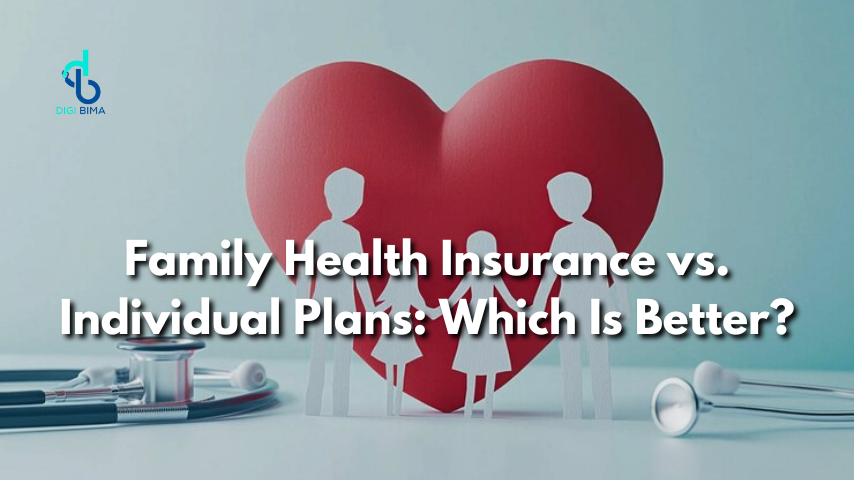Choosing the right health insurance plan can feel like standing in a grocery store aisle, comparing two similar-looking yet distinct products. Should you go for family health insurance, which covers everyone under a single policy?
Or should you opt for individual health insurance plans, where each person has their separate coverage? If you’re trying to figure out which option is better for you, don’t worry—we’ve got you covered.
In this blog, we’ll explore the key differences, benefits, and limitations of both family health insurance and individual plans to help you make an informed choice. And yes, we’ll keep it fun and simple!
What Is Family Health Insurance?
Family health insurance is a policy that covers multiple members of a family under a single sum insured. Typically, the insured individuals can include you, your spouse, children, and sometimes dependent parents.
The beauty of this type of insurance lies in its shared coverage: any family member can use the sum insured, depending on their medical needs.
Example:
A family of four purchases a family health insurance plan with a sum insured of ₹10 lakhs. If one member undergoes hospitalization costing ₹5 lakhs, the remaining ₹5 lakhs is still available for other members during the policy period.
What Are Individual Health Insurance Plans?
Individual health insurance, as the name suggests, provides separate coverage for each person. Every policyholder has their sum insured, ensuring no sharing of coverage among family members. This type of policy is ideal for individuals with specific health needs or when family members have varying levels of health risk.
Example:
Each member of a family of four has their individual health insurance policy with ₹5 lakhs coverage each. If one person uses their coverage for hospitalization, the others still have ₹5 lakhs each for their own needs.
Comparing Family Health Insurance vs. Individual Plans
Let’s break it down further by comparing both options across critical factors:
1. Premium Costs
- Family Health Insurance: Generally more cost-effective, as you’re insuring multiple members under a single plan. This can save you money compared to buying separate policies for each member.
- Individual Plans: Premiums tend to be higher since each member has their own policy with dedicated coverage.
Winner: Family health insurance, especially for younger, healthier families.
2. Coverage Sharing
- Family Health Insurance: The sum insured is shared among all members, which could be a limitation if multiple members require significant medical attention in a single year.
- Individual Plans: Each member has their own coverage, ensuring no one’s claim affects another’s available sum insured.
Winner: Individual plans for families with varying health risks.
3. Adding Members
- Family Health Insurance: Adding a new family member (like a newborn or aging parent) is straightforward and usually affordable.
- Individual Plans: Adding new members means purchasing separate policies for them, which can increase costs significantly.
Winner: Family health insurance for growing families.
4. Coverage for Senior Citizens
- Family Health Insurance: Premiums may increase significantly if you include senior citizens (like parents), as they’re considered high-risk.
- Individual Plans: Senior citizens can have separate policies tailored to their health needs, preventing higher premiums for the rest of the family.
Winner: Individual plans for families with senior citizens.
5. Claim Process
- Family Health Insurance: Multiple claims from different members could exhaust the sum insured, leaving others without coverage.
- Individual Plans: Each policyholder has their own sum insured, so one person’s claim doesn’t impact another’s.
Winner: Individual plans for higher claims scenarios
When Should You Choose Family Health Insurance?
Family Health Insurance is ideal for:
- Nuclear families with younger, healthier members.
- Families that want cost-effective coverage with shared benefits.
- Growing families who may want to add newborns or dependent children to the policy easily.
Example:
Ravi and Priya, both in their 30s, opt for a family health insurance plan for themselves and their two young children. The shared coverage suits their needs as they rarely require significant medical attention.
When Should You Choose Individual Plans?
Individual Plans work best for:
- Families with senior citizens or members who have pre-existing conditions.
- Individuals with specific health risks require dedicated coverage.
- Families where the cost of shared premiums outweighs the benefits.
Example:
Sunil’s family includes his parents, who are over 65 and have existing health conditions. He opts for individual plans for his parents while keeping a separate family health insurance plan for himself, his wife, and their child.
Choosing between family health insurance and individual plans can feel overwhelming, but platforms like Digibima make it easier. As an insurance aggregator in India, Digibima helps you compare policies, evaluate costs, and find the perfect plan for your family’s unique needs.
Conclusion
Choosing between family health insurance and individual plans boils down to your family’s specific needs and circumstances. While family health insurance is cost-effective and easier to manage for younger families, individual plans provide better coverage for diverse health risks and senior citizens.
Assess your requirements carefully and make an informed decision to ensure your family’s health is always protected. With Digibima by your side, finding the perfect health insurance plan has never been easier!
FAQ Section
Q1: Which is cheaper: family health insurance or individual plans?
A1: Family health insurance is generally more cost-effective for families with younger, healthier members, as the premiums are shared.
Q2: Can I add my parents to a family health insurance plan?
A2: Yes, but adding senior citizens may increase premiums significantly. Consider individual plans for parents if their health needs are unique.
Q3: What happens if multiple family members make claims under a family health insurance policy?
A3: The sum insured is shared, so multiple claims could exhaust the coverage. For higher risks, individual plans may be better.
Q4: Is individual health insurance better for senior citizens?
A4: Yes, individual policies tailored to seniors can provide better coverage and prevent higher premiums for younger family members.
Q5: How do I decide between family health insurance and individual plans?
A5: Assess your family’s health risks, coverage needs, and budget. Digibima can help you compare plans and make an informed decision.



